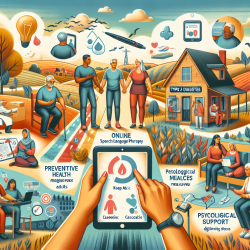Introduction
As practitioners dedicated to improving outcomes for children, we often find ourselves looking for insights from diverse fields to enhance our approaches. The recent study, "The Ups and Downs of Living With Type 2 Diabetes Among Working Adults in the Rural South," offers valuable lessons that can be applied to our practice, particularly in understanding the challenges of self-management and the importance of psychological support.
Key Findings from the Study
The study explores the unique challenges faced by rural working adults with Type 2 Diabetes (T2DM), focusing on their engagement with preventive health services. Four major themes emerged:
- The Struggle: Participants experienced inconsistencies in managing diabetes, feeling overwhelmed by the demands of self-management.
- Doing Things Together: Social support played a crucial role, though it was not always directed towards preventive health engagement.
- Diabetes Is Not the Priority: Many participants prioritized immediate life demands over diabetes management.
- We’re Lucky to Have What We Have: Despite challenges, there was an appreciation for available resources.
Implications for Practitioners
Understanding these themes can guide practitioners in enhancing their therapeutic approaches. Here are some actionable insights:
- Emphasize Psychological Support: The study highlights the need for psychological resources to help manage the emotional burden of chronic conditions. Incorporating mental health support into therapy sessions can improve engagement and outcomes.
- Enhance Patient Activation: Low patient activation scores were linked to poor engagement in health services. Practitioners can focus on building confidence and skills in self-management to improve activation levels.
- Leverage Social Support: Encouraging family and community involvement can enhance the support system, making self-management more sustainable.
Encouraging Further Research
While this study provides significant insights, it also opens the door for further research. Exploring the application of these findings in different contexts, such as pediatric therapy, could yield valuable strategies for improving child outcomes.
Conclusion
The study on Type 2 Diabetes among rural adults underscores the importance of addressing psychological well-being and enhancing patient activation. By applying these insights, practitioners can foster better engagement and outcomes in their therapy services.
To read the original research paper, please follow this link: The “Ups and Downs” of Living With Type 2 Diabetes Among Working Adults in the Rural South.










